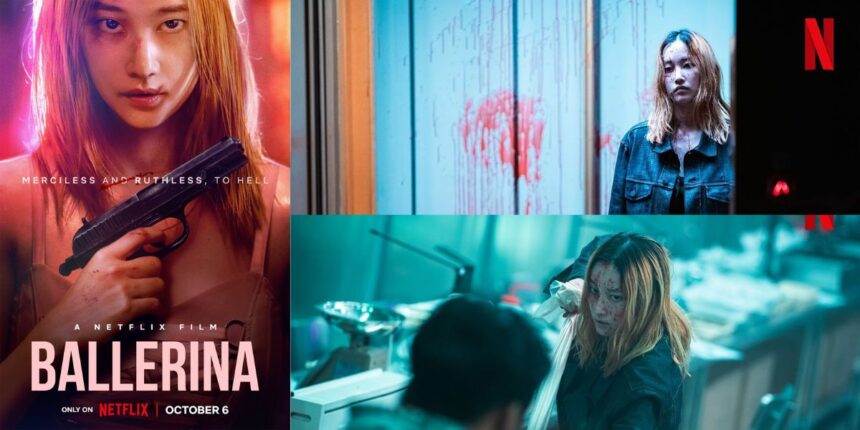In the realm of Netflix originals, “Ballerina” emerges as a dark and enthralling masterpiece that takes viewers on an intense journey through the shadowy world of vengeance and retribution. Directed by the fast-rising Lee Chung-hyung, this film features Jeon Jong-seo in a role that is as enigmatic as it is captivating. Here, we delve into the intricacies of “Ballerina,” a Busan International Film Festival selection that is both unsettling and mesmerizing.
The Unrecognizable Jeon Jong-seo
Jeon Jong-seo, previously known for her role in the 2018 hit “Burning,” undergoes a striking transformation in “Ballerina.” She steps into the shoes of Ok-ju, a former bodyguard with an icy demeanor, who, when provoked, reveals a relentless determination reminiscent of “John Wick.” Ok-ju’s journey begins with the tragic suicide of her best friend, a young ballerina ensnared in a web of blackmail and sexual slavery.
The Korean Approach to Revenge
“Ballerina” is undeniably a revenge film, a genre that Korean cinema has explored extensively. However, director Lee Chung-hyung sets it apart by meticulously establishing the moral compass and motivations of the protagonist, Ok-ju. The film’s initial acts are dedicated to laying the groundwork, making it clear why Ok-ju embarks on her path of ultra-violence.
The Complex Characters
In a genre where characters often blur the lines between hero and anti-hero, “Ballerina” takes an intriguing approach. Jeon Jong-seo, in her role as Ok-ju, acknowledges the shades of gray within her character. She believes that characters who can’t be easily labeled as purely good or evil are the most compelling. Ok-ju, despite her brutality, seeks to win over the audience with her unwavering drive and complex motivations.
Kim Ji-hoon, who portrays Choi, a Lamborghini-driving sexual sadist and gang member, also adds depth to the film’s moral complexities. While Choi hasn’t directly killed anyone, the nature of his crimes makes him a character worthy of hatred. The contrast between the two characters adds layers to the narrative.
The Director’s Vision
Director Lee Chung-hyung infuses “Ballerina” with elements of art and beauty, despite its brutal nature. He views the film as a ballet performance, emphasizing music, visual aesthetics, and the choreography of violence. This approach transforms the film into a unique blend of brutality and beauty, creating an unforgettable cinematic experience.
Filmic References and Stylistic Choices
While preparing for “Ballerina,” Director Lee drew inspiration from films like “Drive” (2011) and “Good Time” (2018). These movies, with their stylized action sequences and vintage Hollywood vibes, influenced Lee’s vision. However, “Ballerina” stands out by offering a female perspective on the revenge genre, infusing it with lyricism and sensitivity.
The Future of Director Lee Chung-hyung
This film marks Director Lee Chung-hyung’s second feature project. While he acknowledges the allure of series for their ability to delve into longer narratives and character development, Lee’s heart lies in filmmaking. He appreciates the concise storytelling of films, where every frame must count.
Visual Storytelling and Preparation
Lee Chung-hyung emphasizes the importance of detailed preparation in visual storytelling. He meticulously plans the visual aspects during the pre-production phase, avoiding extensive improvisation on set. This approach ensures that every frame contributes to the film’s overall narrative and aesthetics.
Director-Actor Dynamics
Both Jeon Jong-seo and Kim Ji-hoon commend Director Lee’s flexible and actor-friendly approach. He tailors his direction to suit each actor’s unique needs, understanding that different actors may require different techniques and guidance. Director Lee’s ability to create the ideal conditions for each actor’s performance stands out as a testament to his directorial prowess.
Exploring the Dark World of Vengeance
“Ballerina,” the Netflix movie directed by Lee Chung-hyung, takes viewers on a visceral journey into the heart of darkness. Unrecognizable from her previous role in “Burning,” Jeon Jong-seo dominates the screen as Ok-ju, a former bodyguard with a chilling aura. However, beneath her calm exterior lies a torrent of pent-up rage, awakened by the suicide of her best friend, a hopeful ballerina ensnared in a web of blackmail and sexual slavery.
Director Lee Chung-hyung masterfully guides the audience through a harrowing tale of vengeance and redemption. While the film is undoubtedly a revenge story, it is quintessentially Korean in its dedication to character development and moral exploration. In the first two reels, Lee meticulously establishes Ok-ju’s moral compass and the motivations that drive her towards a path of relentless violence, akin to the iconic “John Wick.”
Catharsis Through Punishment
One might wonder, in a cinematic landscape saturated with bloody revenge tales, why create another one? Director Lee’s answer is as intriguing as it is thought-provoking. He sought to provide the audience with a form of punishment rarely attainable in real life. The act of vengeance, in this context, becomes a cathartic experience for viewers, offering them a sense of closure and justice.
The revenge genre often blurs the lines between hero and anti-hero, leaving characters morally ambiguous. Jeon Jong-seo, in her portrayal of Ok-ju, recognizes the complexity of her character. She believes that one-dimensional characters are uninteresting. True intrigue lies in the gray areas, where good and evil coexist. Ok-ju’s capacity for violence is undeniable, yet her unwavering drive makes her a compelling and, surprisingly, sympathetic figure in the eyes of the audience.
The Ambiguity of Morality
Kim Ji-hoon, who takes on the role of Choi, a Lamborghini-driving sexual sadist and a rebellious gang member, adds depth to the film’s moral complexities. Choi’s crimes, though he has not directly taken lives, are abhorrent and unforgivable. As the actors discuss the characters, a fascinating moral debate arises. If Ok-ju and Choi were to stand trial, Ok-ju might receive a longer sentence due to the number of people she has killed, even though Choi’s crimes are arguably more heinous. It’s a testament to the film’s ability to challenge conventional notions of morality.
A Ballet of Violence and Beauty
Director Lee Chung-hyung has a unique vision for “Ballerina.” While it firmly resides within the action genre, he envisions it as a ballet performance. The film’s artistry extends beyond its plot; it delves into the realms of music, visual aesthetics, and the choreography of violence. Lee’s approach is an attempt to transform brutality into a form of beauty, a paradox that captivates and mesmerizes viewers.
Inspirations and Unique Perspectives
During the preparation for “Ballerina,” Director Lee drew inspiration from films like “Drive” (2011) and “Good Time” (2018). These movies, with their stylized action sequences and vintage Hollywood influences, played a significant role in shaping the film’s stylistic choices. However, “Ballerina” distinguishes itself by offering a narrative from a female perspective, infusing it with lyricism and sensitivity.
Film vs. Series: The Director’s Choice
As Director Lee Chung-hyung reflects on his career, he acknowledges the allure of both film and series. While series allow for deeper character exploration and more extended narratives, films hold a special place in his heart. The concise storytelling of films, where every frame must convey meaning, appeals to his artistic sensibilities.
The Importance of Pre-Production
Lee Chung-hyung underscores the significance of detailed preparation in visual storytelling. Rather than relying on improvisation on set, he prefers to plan meticulously during the pre-production phase. This approach ensures that every shot contributes to the film’s narrative and aesthetics. It’s a testament to his dedication to creating a visually stunning and emotionally resonant experience.
Director-Actor Collaboration
Both Jeon Jong-seo and Kim Ji-hoon commend Director Lee’s flexible and actor-friendly approach. He tailors his direction to suit each actor’s unique needs, understanding that different actors may require different techniques and guidance. Director Lee’s ability to create the ideal conditions for each actor’s performance stands out as a testament to his directorial prowess.
In conclusion, “Ballerina” on Netflix is not just another revenge film; it’s a profound exploration of morality, revenge, and the intricate nature of human characters. Director Lee Chung-hyung’s artistic vision, combined with the exceptional performances by Jeon Jong-seo and Kim Ji-hoon, make “Ballerina” a must-watch for those seeking a cinematic experience that seamlessly blends brutality with beauty.





